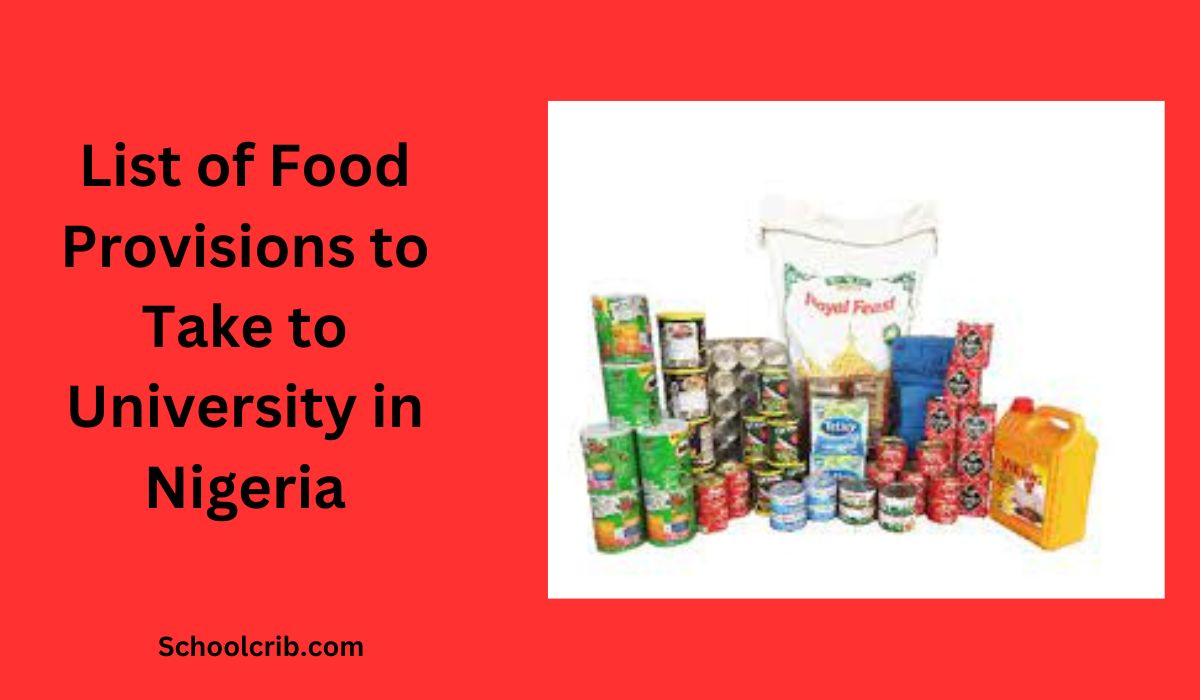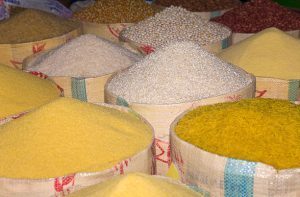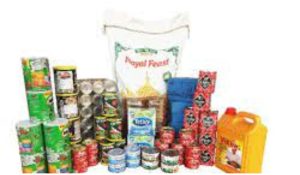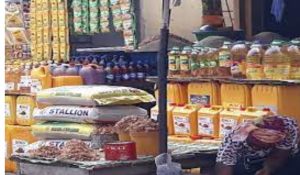List of Food Provisions to Take to University in Nigeria

If you are searching for a list of food provisions to take to university in Nigeria, you are in the right place!
As a student, you need to eat good food in order to stay healthy.
The importance of good food cannot be overemphasized.
As a student, the kind of food you eat has a long way to go in deciding how well you will perform academically.
There is no doubt that students who feed well would likely outperform those who don’t.
So if you want to stay on top of your game, you have to ensure you eat only a balanced diet as this will be beneficial not only to your academics but your life in general.
When packing for the university, you have to ensure you pack the necessary food provisions.
This will help ensure that you don’t lack any food items when you get to school.
In this guide, we will take a look at the list of food provisions to take to university in Nigeria.
Ready? Let’s go!
Also Read: What Should I Take to University As a Fresher in Nigeria?
List of Food Provisions to Take to University in Nigeria

Here’s the list of food provisions to take to university in Nigeria:
1. Non-Perishable Staples
When you’re at university, non-perishable staples like rice, pasta, beans, garri (cassava flakes), and yam flour (elubo) become your best friends.
These are easy to store and can be the base for many meals.
2. Canned Foods
Canned foods are a lifesaver when you’re low on time or don’t have access to fresh ingredients.
Stock up on canned vegetables, canned fish (sardines, mackerel, tuna), and canned beans.
3. Dry Ingredients and Spices
To add flavor to your dishes, don’t forget essential dry ingredients and spices like ground pepper, salt, seasoning cubes (Maggi, Knorr), curry powder, thyme, ginger, and garlic powder.
These can turn a basic meal into something delicious.
Recommended: Top 12 Cheapest Schools of Nursing in Nigeria
4. Cooking Oil
You’ll need cooking oil, so pack palm oil or vegetable oil. These are essential for frying, sautéing, or making sauces.
5. Grains and Cereals
Variety is key, so consider bringing oats, cereal (e.g., cornflakes), millet, or quinoa for a change from the usual staples.
6. Dried Foods
Dried foods like dried fish, crayfish, and pepper can add a unique flavor to your dishes.
Don’t forget dried vegetables like ugu and bitter leaf. They can make your meals healthier.
Also See: 10 Best Courses to Study in Colleges of Health Technology in Nigeria
7. Beverages
If you’re a tea or coffee lover, bring tea bags, coffee, and cocoa powder.
And don’t forget powdered milk.
You might want to invest in a water filter or bring bottled water for drinking.
8. Snacks
Late-night study sessions require snacks.
Pack biscuits, nuts (peanuts, cashews, almonds), popcorn kernels, dried fruits, and energy bars for those munchies.
9. Condiments and Sauces
Condiments and sauces can make your meals more exciting.
Consider ketchup, mayonnaise, soy sauce, hot sauce, and different salad dressings.
Aldo Read: 20 Best Colleges of Health Technology in Nigeria
10. Fresh Produce (if available)
If you have access to a small fridge or nearby market, stock up on fresh produce like onions, tomatoes, bell peppers, green vegetables (e.g., spinach, ugu), and fruits (e.g., bananas, oranges, apples) for a balanced diet.
11. Cooking Equipment
Depending on your hostel rules, a portable gas stove or electric hot plate can be a game-changer.
Don’t forget cooking pots and pans, utensils, plates, bowls, and cutlery.
Food storage containers will also help keep things organized.
12. Cleaning Supplies
Maintaining cleanliness is crucial.
Bring dish soap, a scrubbing sponge, and a dish rack to keep your eating utensils clean.
Recommended Top 15 Best Medical Courses to Study in Nigeria
13. Storage Containers
Airtight containers are perfect for storing dry ingredients, and Ziplock bags can be handy for portioning and storing food items.
14. Special Dietary Items
If you have specific dietary needs or preferences, make sure to bring foods that cater to them.
It’s essential to stay healthy and comfortable with your food choices.
15. Medications and First Aid
Don’t forget any necessary medications or supplements you might need.
A basic first-aid kit is also a good idea for minor injuries or illnesses.
16. Cookbooks or Recipe Cards
Bringing some favorite recipes or cookbooks can inspire you to cook diverse and nutritious meals.
Plus, it’s a great way to bond with roommates over cooking adventures.
Remember, the key to successful university food provisioning is balance.
Mix convenience with nutrition, and always follow your university’s rules regarding cooking appliances and food storage in your accommodation.
Also See: 15 Most Useless Courses to Study in Nigeria
Benefits of Packing Food Provisions for University in Nigeria

There are so many benefits of packing food provisions for university.
They include:
1. Cost Savings
Packing food provisions is cost savings.
I mean, university can be pricey, and eating out or hitting up the cafeteria all the time can really drain your wallet.
By packing your own food provisions, you’re basically putting extra money in your pocket for other important stuff, like textbooks or weekend adventures.
2. Nutritional Control
Imagine having complete control over what goes into your meals.
That’s what you get when you pack your own food.
If you’re super health-conscious or have dietary restrictions, this is a game-changer.
You’re the boss of your diet, and that’s pretty awesome!
3. Convenience
Picture this: you’re in the middle of an intense study session, and your stomach starts growling. No worries!
Your packed food is right there, ready to satisfy your hunger.
It’s all about convenience, my friend.
Also Read: Top 15 Easiest Courses to Study in Nigeria
4. Healthier Choices
You can include all the good stuff in your provisions, which might not always be readily available elsewhere.
Your body will thank you for those healthier choices.
5. Cultural and Culinary Preferences
For some of us, nothing beats the taste of home-cooked meals or dishes that reflect our cultural background.
When you pack your own food, you can enjoy those flavors and keep the taste of home alive.
6. Reduced Stress
Exams, assignments, and deadlines can be stressful enough.
With your own food stash, you can say goodbye to the stress of finding meals in the midst of all that chaos.
It’s like a comforting food safety net.
Recommended: Top 15 Hardest Courses to Study in Nigeria
7. Time Management
Time is precious, especially in college.
When your meals are ready to go, you can manage your time more efficiently.
No need to rush around looking for food, which means more time for studies or fun activities.
8. Independence and Life Skills
Last but not least, packing your own food is a fantastic way to develop some essential life skills.
You’ll learn how to plan meals, shop for groceries, cook, and keep track of your food inventory.
These skills will serve you well not just in college but throughout your life.
So, there you have it! Packing your own food provisions isn’t just about saving money; it’s about taking control of your diet, reducing stress, and gaining valuable life skills.
Plus, you get to enjoy the flavors of home while you’re away at university.
Also See: Why Do High School Relationships Fail?
Factors to Consider When Packing Food Provisions for University in Nigeria

When packing food provisions for the university, several factors need to be considered to ensure that the food is safe, nutritious, and practical for the university environment.
Here are some key factors to keep in mind:
1. Cultural Preferences
Nigeria is a diverse country with various ethnic groups, each having its own culinary preferences.
Consider your cultural background and dietary habits when packing food provisions.
Ensure that the food choices align with your cultural and religious beliefs.
2. Nutritional Balance
As a university student, you need a well-balanced diet to support your physical and mental health.
Include a variety of foods that provide essential nutrients such as carbohydrates, proteins, healthy fats, vitamins, and minerals.
Incorporate fruits and vegetables for added nutrition.
3. Food Safety
Food safety is paramount to prevent foodborne illnesses.
Pack perishable items in a way that keeps them cool and safe.
Use insulated containers or coolers with ice packs if needed. Avoid packing foods that spoil easily in hot weather.
Also Read: What to Wear to a High School Reunion
4. Storage Containers
Use appropriate storage containers that are easy to clean and maintain.
Ensure that containers are airtight to prevent food from spoiling or becoming stale.
Invest in reusable containers to reduce waste.
5. Portion Control
Pack food in portion sizes that are suitable for one meal.
This helps prevent overeating and reduces food waste.
It’s also more convenient for you to grab a single portion when you’re hungry.
6. Convenience and Accessibility
Consider your daily schedule and access to kitchen facilities.
Pack foods that are easy to prepare and consume, especially if you have limited cooking facilities in your dormitory or hostel.
Recommended: How Many Clubs Should I Join in High School?
7. Local Availability
Choose foods that are readily available in the local market to make replenishing supplies easier and more cost-effective.
Buying locally also supports the local economy.
8. Longevity and Shelf Stability
Include some non-perishable items with a longer shelf life, such as canned goods, rice, pasta, and dried fruits.
This ensures that there are food options available even when fresh ingredients may not be readily accessible.
9. Budget Constraints
Keep in mind your budget when packing food provisions.
Opt for cost-effective options while maintaining nutritional value.
Also See: How Long Is a High School Graduation?
10. Variety
Pack a variety of food options to prevent monotony and encourage a balanced diet.
Include different types of grains, proteins, and snacks.
11. Sustainability
Consider environmentally friendly packaging options to reduce waste.
Encourage the use of reusable containers and avoid excessive packaging.
Also Read: How Long Do High School Relationships Last?
12. Community and Sharing
If you are open to sharing, pack extra portions that you can share with your roommates or friends.
Sharing meals can foster a sense of community and reduce food waste.
13. Cultural Celebrations
Be aware of special occasions or holidays that may require specific foods or dishes.
Plan accordingly to celebrate these cultural events.
Overall, packing food provisions for the university should prioritize cultural preferences, nutritional balance, food safety, and practicality.
By considering these factors, you can ensure you have access to nourishing and culturally appropriate meals during your university years.
Recommended: Are There Ivy League Schools in California?
Frequently Asked Questions (FAQ)
What Should I Not Pack for University?
There are some things you don’t need to pack for university to lighten the load.
Forget the overstuffed wardrobe – you won’t wear it all.
Don’t lug your entire bookshelf; digital and library resources have you covered.
No need for bulky furniture; dorms come furnished.
Kitchen gadgets? Probably not – most places have communal gear.
Trim down on toiletries; you can restock them locally.
And if you’re heading to a warm climate, leave the winter gear at home.
Streamlining your packing list means less stress and more space for the essentials, making your university journey smoother.
What Can I Eat for Dinner As a Nigerian Student?
As a Nigerian student, dinner options are diverse and delicious.
You can go for classics like Jollof rice or Egusi soup with pounded yam.
If you’re feeling adventurous, try Suya, a grilled meat skewer with spicy peanut sauce.
There’s also fried rice, moi moi (steamed bean pudding), and Amala with ewedu and gbegiri soup for a taste of tradition.
Fast food joints offer burgers, pizzas, and shawarmas.
And don’t miss out on local snacks like puff-puff or egg rolls.
With Nigeria’s rich cuisine, dinner is a culinary adventure waiting to happen every night!
How Do I Prepare for My First Year of University?
Getting ready for your first year at university is exciting!
First, gear up academically by revisiting study habits and creating a study plan.
Explore the campus and its resources to feel more at home.
Financially, set a budget and explore financial aid options.
Emotionally, be open to new friends and experiences, and find ways to manage stress.
Pack all your essentials and make sure you have your documents in order.
Most importantly, keep that adventurous spirit alive, stay adaptable, and stay curious.
Your first year is going to be a fantastic journey, so dive in with enthusiasm and resilience!
What Is the Best Age to Enter University in Nigeria?
The ideal age to start university in Nigeria varies.
Many go straight after high school in their late teens or early twenties, but it’s not one-size-fits-all.
Some take time off for work or other experiences before enrolling.
Others, like mature students, jump into university in their 30s or beyond.
What matters most is personal readiness and aligning your education with your goals.
Whether you’re a fresh-faced school leaver or someone with more life experience, the best age to start university is when you’re all set to pursue your dreams and dive into your studies wholeheartedly.
What Should I Take to University As a Fresher in Nigeria?
As a fresher, make sure to pack your academic gear – textbooks, notebooks, and a trusty laptop.
Don’t forget admission documents, IDs, and fee papers.
Dress for the local weather, comfy for class, and cultural for events.
Personal care stuff and basic medications are a must. With malaria around, bring a mosquito net and repellent.
Toss in a bit of home, like photos, and most importantly, bring an open mind and a friendly vibe.
Also See: What Is Creative Writing in High School? (Fully Explained)
Conclusion
Packing food provisions rightly when preparing for university is very essential especially if you are a fresher.
School itself can be very stressful and not eating good food even makes it worse.
In this article, I’ve shown you the list of food provisions to take to university in Nigeria.
So ensure you take these food provisions and even add others you feel you will need that weren’t mentioned here.
And most importantly, stay away from junk.
Junk foods are not good for your health and can affect your academic performance.
If you have any questions or inquiries, kindly drop them in the comment section and I will respond right away.
Best of luck!
Related Posts:
- 15 Best Online Jobs for High School Students
- Can You Go Back to High School After Dropping Out?
- What Happens If You Fail a Class in High School?
- How Long Does It Take to Get a Counseling Degree?
- How Long Does It Take to Get a Finance Degree?
- Is a Business Degree Hard? (Find Out)
- Is a Biology Degree Worth It? (Find Out)
- Is a Political Science Degree Worth It?
- What Can You Do with a Music Production Degree?
- Can You Be a Dental Assistant without a Degree?








